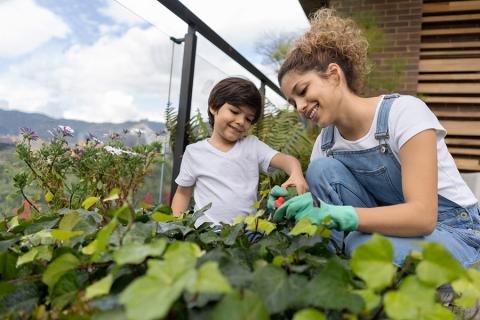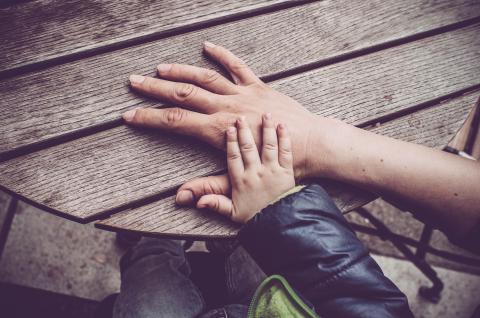Have you and your family been impacted by domestic violence?
You are not alone.
Your journey of hope begins here.
Domestic Violence impacts the entire family - especially children.
2 out of 3 children in the United States experience trauma or violence. These experiences can affect a child's development and increase the risk of harmful behaviors, and the risk of future physical or mental health issues. However, there are things that can help interrupt the negative impact of trauma and violence.
Adverse Childhood Experiences (ACEs) are events that occur during childhood (before the age of 18) that can have long-lasting effects on physical and mental health. These include:
● Experiencing violence, abuse, or neglect.
● Witnessing violence in the home or community.
● Having a family member attempt or die by suicide.
There is hope. Just by being here, you have already begun. Take a minute to realize that you are already on your journey of hope. That is something to be proud of.
Protective & Compensatory Experiences (PACEs) can counteract the damaging effects of ACEs. PACEs include:
● Unconditional love from a caregiver
● Positive parenting
● Having rules and routines
By adding therapeutic activities, such as counseling, recovery can be supported with by developing coping skills, stress regulation, and building healthy relationships.


Center for Family Services honors you on your pursuit of a brighter and more peaceful tomorrow. The Peaceful Tomorrows program provides children ages 3-18 and their caregiver in Camden, Cumberland, and Gloucester counties who have experienced domestic violence, counseling and additional supports.
Through trauma informed care, case management and other services, Peaceful Tomorrows works to support you in healing from the effects of domestic violence, disrupting the cycle of abuse, while also helping you and your family build a future full of hope.
In addition to Peaceful Tomorrows, Center For Family Services offers many other resources and services to help you and your loved ones on your journey of hope. With programs spanning New Jersey, our highly trained professionals are here to help you with any challenges you might be facing including:
- Domestic Violence
- Sexual Violence
- Human Trafficking
- Addiction & Recovery
- Safe Housing
- Counseling & Behavioral Health


"Having support and knowing that there are people there that are going to help and that we are not doing this by ourselves."
- Peaceful Tomorrows participant on their journey of hope
Did you know hope is the only positive emotion that relies on negativity or uncertainty to be set in motion? You are here because you are facing a challenge and hope is now motivating you to pursue a change.
“Hope is the belief that the future will be better than today, and that we have the power to make it so.” - Chan Hellman, Director of the Hope Research Center

The science of hope rests on the belief that hope is a teachable skill. Hope is not only an emotion, but a way of thinking. Nurturing you and your children’s hope can help heal from traumatic experiences and build positive future experiences. Within the framework of hope, dreams are encouraged; pathways and goals are created and pursued; belief in oneself and others is nurtured; and positive forward momentum is created.
Because hope is teachable, possible, and measurable we can all work together to take actionable steps towards a better tomorrow.
Stepping into the support role for someone navigating trauma can redefine what it means to be there for someone. Whether you’re providing a safe space for a friend to stay, creating an environment where they can express themselves, or validating their feelings as a trusted confidant, you play a crucial role in their journey.
As their hope hero, remember that you are not alone in this effort. Here are some ways to support them:

1. Listen Without Judgment: Create a safe space where they can express themselves freely without fear of judgment. Your openness will encourage them to share their feelings and experiences.
2. Validate Their Feelings: Acknowledge their emotions and let them know that it’s okay to feel what they’re feeling. Reinforcing their sense of security is vital.
3. Allow Them to Lead the Conversation: Let them guide the discussion at their own pace, offering validation and support along the way. This empowers them to share what they need to.
Your caring and compassionate demeanor is invaluable, but you may also need to direct them to additional resources. The journey of hope for a survivor requires support, and you are helping to foster a sense of security while continuing to establish their hope.
Family Helpline - 1.800.THE.KIDS (843.5437)
2nd FLOOR Youth Helpline NJ - 1.888.222.2228
*If you or someone you know is in immediate danger, please call 911 or your local emergency services.*
“Domestic Violence isn't always obvious or easy to spot. There are many ways people abuse others and it is not always in a domestic setting. The best thing you can do is educate yourself to better prepare yourself and your children in the future. Everything seems overwhelming at first when you leave an abusive relationship but with time it does get better. It may not seem like it at first but the more you educate yourself and look at the bigger picture of living a better life and living for the future you will see it's not just about surviving day to day. You need to set goals and boundaries and you may lose more people along the way to rediscovering yourself but it will be worth it to live a more peaceful life. Learn to enjoy and appreciate the little moments of peace and joy.” – Peaceful Tomorrow’s Participant



